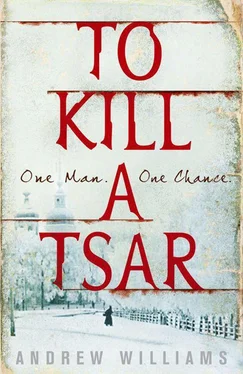‘May I ask who, Your Honour?’
‘Major Barclay of the Corps of Gendarmes. Although…’ Dobrshinsky gave the agent a dry smile, ‘…the Major does not yet know of his good fortune.’
Winter slipped away in the night. The city woke to the jangle of cathedral bells that second Sunday in April to find the Neva flowing freely after months choked with ice. By midday its banks were lined with Petersburgers enjoying the sunshine and the spectacle of the governor’s barge as it made its stately way upriver to the Winter Palace, a flotilla of smaller craft in its wake. In the splendour of the Great Antechamber, the tsar and court were waiting as the clergy prepared a little wooden chapel on the embankment for the traditional blessing of the river’s slate-grey waters. There was still a carnival atmosphere three hours later as Frederick Hadfield’s droshky began pushing slowly through the crowd spilling on to the road before the Admiralty. Caught by the change in the weather, his driver was sweating profusely in a padded kaftan, exuding a vintage odour of stable shit, foul enough to offend even the horse. With relief they turned on to the Fontanka Embankment at last, and at the Chernyshev Bridge he jogged the smelly Ivan’s elbow. The cab rattled to a halt, he paid then waited at the edge of the pavement as it pulled away.
The three- and four-storey mansions on either side of the Fontanka were not as imposing as those a little further up the river; many had been sold by the great families that once owned them and divided into apartments for army officers, lawyers, Class 6 civil servants and below, and after years of neglect they were in desperate need of a coat of paint. Number 86 was on the opposite bank, a pink and white house in the Russian classical style with an elegant blind colonnade of four pillars in the middle of its facade. Hadfield had found an excuse to saunter past earlier in the week — to check the address, he told himself — but once there, he had begun to make a mental note of the embankment, to search for men loitering in doorways or at windows, to scrutinise the faces of passers-by. After only a short time he had given up, forced to acknowledge he had no idea what he was looking for and that an anxious imagination was capable of turning every builder and bargeman into a police informer.
Number 86 looked a brighter shade of pink in the sunshine but in all other respects quite as it had before. Did it matter? He was visiting it at the invitation of his friend Vera: a tight ball in the pit of his stomach told him it did matter. A scruffy dvornik was loafing at the door of a neighbouring mansion with his pipe in hand, but he eyed Hadfield with no more than mild curiosity. Beyond him four well-dressed children and their governess were throwing crusts to a flotilla of swans. A fine brougham with a coat of arms painted on its shiny blue door clattered past. It was Sunday quiet and Hadfield had the uncomfortable feeling that the only person behaving furtively was himself. He leaned forward to flick imaginary dust from his trousers, then, rising quickly, he walked across the road to the end of the bridge and between its great stone pavilions to the opposite bank.
After glancing up and down the street again, he stepped forward to the door of Number 86 and gave the bell a decisive tug. It was opened by a footman in a faded green velvet uniform, a gangly youth of no more than eighteen with a long pimply face. He ushered Hadfield inside at once. The entrance hall and the marble stairs that led from it were elegantly proportioned but shabby, the yellow and white painted walls stained with damp, the burgundy runner threadbare. With a graceless sweep of his hand, the footman indicated to Hadfield he should follow him to the first floor.
‘Who lives in the house?’
The footman sneezed then wiped his nose on his sleeve. The iron filigree of the banister was thick with dust.
‘My mistress, Yuliya Sergeyovna Volkonsky, Your Honour.’
An aristocratic name — Hadfield remembered from his school books that a Volkonsky had commanded Russian forces at the battle of Austerlitz — this member of the family must have fallen on hard times. A full-length portrait of a soldier in the white uniform of the Life Guards dominated the landing. A polished mahogany door to the right of the picture was ajar and voices were gusting through it. The footman walked across the landing and opened it without ceremony. The sudden movement must have startled those close to the door because faces turned to Hadfield and for a few seconds there was a wary hush. But a young man in tweed with a rakish soft blue tie and shoulder-length hair was most unlikely to have arrived with a troop of gendarmes and conversation resumed with something close to a collective sigh.
A smartly dressed woman in her fifties glided across the carpet to greet him. ‘Have we met before?’ Her voice was high pitched and imperious.
‘Doctor Frederick Hadfield, madame.’
‘Vera Nikolaevna’s English friend?’
‘Yes.’
Yuliya Sergeyovna offered him her hand but not her name, presuming with the assurance of her class that he would know it already. She was short and gamine, her face startlingly thin — her sallow skin hung in folds from her cheekbones — a high forehead, bottle-black hair pinned and parted in the centre and small restless hands. She was wearing a fine emerald green skirt with fashionable pleated frills and ruching and a matching jacket: clothes she might choose for a tea salon at the imperial court.
The drawing room was large and rectangular in shape, dimly lit by gas sconces, and the blinds were pulled down conspiratorially over the windows at the far end. There were perhaps forty people chatting in small groups, drinking tea and smoking, some standing, some perched uncomfortably on gilded French sofas and fauteuils. Most were men in their twenties, dressed informally in short jackets, some with open-necked shirts. Lounging at the large marble fireplace, a group of students in the high collared uniforms the authorities required all who studied at the university to wear. From infancy to dotage, it seemed to Hadfield, there was a uniform for every age, every occupation in the empire. He had mentioned it to one of his colleagues at the hospital who told him with a resigned shrug that the country hung from a thread of braid because a Russian only knew his place if he was in uniform. Doctors were the exception to this rule and Hadfield considered it fortunate the only uniform he was obliged to wear was a hospital coat.
Madame Volkonsky led him through the gathering to the opposite end of the room where three young women were bent together in close conversation, their faces in silhouette against the dim light of a window: ‘Vera, dear… your English friend…’
Instinctively they stepped away from each other like children caught sharing a guilty secret.
‘You’re late, Frederick,’ Vera said, holding out her hand to him, small and cold to the touch, ‘I’d almost given up on you.’
It was four years since they had met last but her manner was as cool and matter-of-fact as if she had seen him only that morning and had been waiting a little impatiently to go to one of the lectures they used to attend in Zurich.
‘How are you, Verochka?’
‘Quite well. As you can see,’ and her hands fluttered gracefully down her black dress. More than well, he thought, she was even more beautiful than he remembered her: chestnut-brown hair tied in a bun, finely cut features, almond-shaped eyes and full lips that turned down a little disdainfully at the corners. A small intimidating frown played constantly between her dark eyebrows. It was a severe beauty. Poor Alexei Filippov: Vera’s husband was a provincial lawyer with decidedly conservative views. It was the most unlikely of marriages. Hadfield had watched Filippov trailing around Zurich in Vera’s wake, pink with embarrassment and irritation as the eyes of a hundred adoring students followed her hungrily about the medical faculty.
Читать дальше












